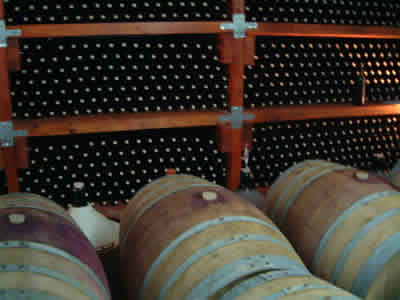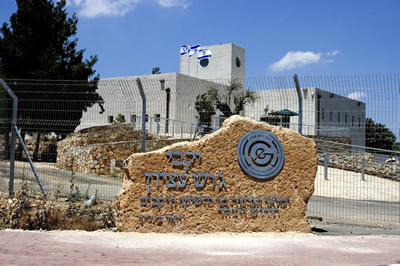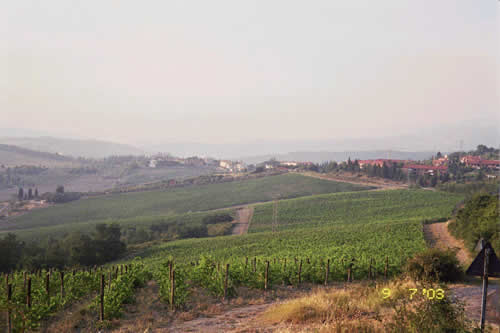Search our Archives:
» Home
» History
» Holidays
» Humor
» Places
» Thought
» Opinion & Society
» Writings
» Customs
» Misc.
|
Annals of a Traveller
By Jay Levinson
There are some two hundred "boutique wineries" that have sprung up in Israel. Large operations such as Carmel, Barkan and Efrat specialize in mass production and popular prices, and Yarden in the Golan is known for a more expensive product though still sold extensively in Israel and abroad. The smaller wineries, however, are predominately family operations that concentrate on gourmet products for the wine connoisseur. HaMasrek is one such family enterprise, run by the Greengrass family.
Avraham Greengrass was a Jerusalem tailor, but during the Arab Siege of Jerusalem he had trouble making ends meet. His ration book did not allow purchase of enough food to feed his family. So, when Beit Meir was established in 1950 on the ruins of an abandoned Arab village some ten miles west of Jerusalem, Greengrass uprooted his family and moved into the new settlement. He left needle and thread behind, and became a farmer, planting a small field and raising chickens. Food was no longer a problem.
Beit Meir, named after Meir Bar-Ilan and restricted to Shabbat observing residents, was a quiet place to live. To the south is what has become the Israel Path for hiking, and to the north is the Burma Road, the makeshift road built during the War of Independence to bring supplies to Jerusalem.
Times changed. Israeli economics of the 1980s and 1990s were not the same as the 1950s and 1960s. It was no longer feasible to depend on a small farm and chicken eggs. It was then that Nahum Greengrass, Avraham's grandson, decided to convert the chicken coup into a winery. In 2000 HaMasrek wines went into production.
When Palmach fighters were constructing the Burma Road, they looked at the trees in the area and described them as bristles on "a brush" (Hebrew, "masrek"). The name stuck. There is the Masrek Nature Reserve next to Beit Meir, and Greengrass decided to call his wine company by the same word.
Grape vines reach their best flavor twelve years after planting, and proper wines require two or three years to prepare. Rather than quickly producing an inferior product, Greengrass contracted with nearby Shoresh to purchase quality grapes from mature vines. HaMasrek, however, never bought all of the grapes grown in Shoresh; the contract stipulates that the winery does not buy products of the shmita year.

Oak Room
HaMasrek produces some 25,000 bottles of wine each year. Cabernet Sauvignon, Chardonnay and Gewürztraminer are the house standards, but as good as the wines are, the question of marketability arose. How does one enter foreign markets, where most wine is sold?
Nachem Greengrass traveled several times to the United States, looking to find a niche in the American market. Advice was plentiful --- try not to compete was the common line. "It will be hard to sell another Chardonnay or another Gewürztraminer. There already are numerous brands on the market." So, Greengrass pondered the issue and came up with an innovative solution --- a totally new product --- King's blend, a delicate combination of three wines in different proportions and blended together by a house-developed process. Sales began, and success was at hand.
If you are in the Beit Meir area, a visit to the winery is certainly an interesting experience. Hours are Fridays 1000-1500 (closes earlier in the winter) and during the week by prior arrangement. Tel. 02-570-1759 or 054-4830827. The winery is closed to visitors during August and September, when grapes are receive and processed. During the one hour tour, explanations of the wines are given in Hebrew and English by Nahum Greengrass, so answers to questions are authoritative. There is no fee, and the visit includes wine tasting. The winery is wheelchair accessible.

Etziyon Winery
In another case Shraga Rosenberg, once the manager of a retirement home, had a dream. In 1994 he looked out at his garden in Efrat, remembered the blessing of wine given to Yehudah (see Bereishis 49:11 and Rashi), and decided to make blackberry wine in his basement. From fruit wines in a home-spun operation, his efforts evolved into the Gush Etzion Winery, a modern facility on the road to Alon Shevut and Kfar Etziyon. Yes, the company still makes blackberry wine, but now it is more famous for its top of the line Cabernet Franc, which won a gold medallion in November 2007 at the Teravino contest in Israel. All of their numerous wines are Kosher for Passover. Want to taste? Attached to the winery there is a dairy restaurant, where wines can be bought either by the glass or by the bottle. Wheelchair accessible with assistance up a ramp.
~~~~~~~
from the Februrary 2009 Edition of the Jewish Magazine
|





|
